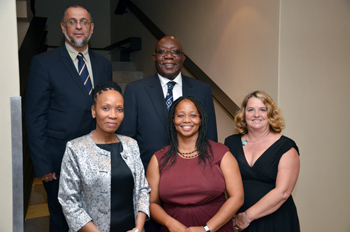Latest News Archive
Please select Category, Year, and then Month to display items
14 June 2024
|
Story Anthony Mthembu
|
Photo Suplied
 Jeremiah Hlahla, a UFS student completing his PhD in Botany at the University of Debrecen as part of an exchange initiative funded by the Erasmus+ Mobility Programme.
Jeremiah Hlahla, a UFS student completing his PhD in Botany at the University of Debrecen as part of an exchange initiative funded by the Erasmus+ Mobility Programme.
As part of an exchange initiative facilitated by the Erasmus+ Mobility Programme, Jeremiah Hlahla, a student at the University of the Free State (UFS), is nearing the completion of his PhD studies at the University of Debrecen in Hungary. Hlahla’s journey, which began in February 2024 and is set to conclude in July 2024, has been a remarkable learning opportunity. “As a first time-traveller to Europe, I have thoroughly enjoyed engaging with people from different countries and cultures,” he said.
The benefits of international collaboration
Hlahla is currently pursuing a PhD in Botany, focusing on plant stress physiology. “My current PhD project investigates the physiological, biochemical and morphological responses of vegetable-type soybean, or edamame, to combined drought and heat stress,’’ he explained. He considers the University of Debrecen the ideal institution to complete his research due to its extensive expertise and resources in similar projects. He noted that his colleagues at Debrecen conduct significant work on plant protection against biotic and abiotic stresses, including salt and drought stress, as well as proteins and amino acids in barley and other legumes.
Given the vast knowledge available on similar projects, Hlahla has found substantial engagement with his work at the University of Debrecen. “Upon arrival, I delivered an introductory lecture presenting my UFS project on the synergistic effects of combined drought and heat stress on the physiology and biochemistry of edamame. It was an engaging session as everyone could relate to my work and asked many questions,’’ he said.
Insights gained from the exchange
Hlahla has also gained valuable lessons that will assist him in his research career, including biotechnology and physiology tools. “I learned how to prepare samples and use high-performance liquid chromatography (HPLC) and reversed-phase ultra-high-performance liquid chromatography (UHPLC) to quantify proteins and amino acids,’’ he said. These techniques are beneficial not only for his current work but will also support future soybean research.
As his experience at the University of Debrecen nears its end, Hlahla reflects on the collaborations and friendships he has formed, which stand out as a significant highlight.
Twenty years of human rights - a call for reflection on the successes and challenges
2015-02-25

Back from the left are: Advocate Mohamed Shafie Ameermia, Commissioner, South African Human Rights Commission Advocate Lawrence Mushwana, Chairperson of the South African Human Rights Commission Front from the left are: Honourable Mahube Molemela, Judge President of the Free State High court and Acting judge of the Constitutional Court of South Dr Choice Makhetha, Vice-Rector External Relations, University of the Free State Prof Caroline Nicholson, Dean of the Faculty of Law, University of the Free State |
The South African Human Rights Commission (SAHRC), the Faculty of Law, and the Free State Department of Education hosted a gala dinner on 19 February 2015 to celebrate the launching of the Free State Provincial Division of the SAHRC, reaffirming their collaborative partnership, and confirming the commitment of the Free State Department of Education to community engagement, constitutional rights awareness, and youth advocacy.
The number of human rights abuses reported to the Human Rights Commission in recent years points to the complex nature of the challenges faced by South African communities. What is most disturbing is that the overwhelming majority of these offences are perpetrated by the youth, said Adv Lawrence Moshwana, Chairperson of the South African Human Rights Commission. “The Human Rights Commission is in need of support from government in order to be able to reach all provinces of South Africa”. The expansion of the commission’s services in the Free State and its partnership with the Provincial Department of Education is a great step towards protecting the rights of the most vulnerable communities.
Twenty years of human rights (read the full story)